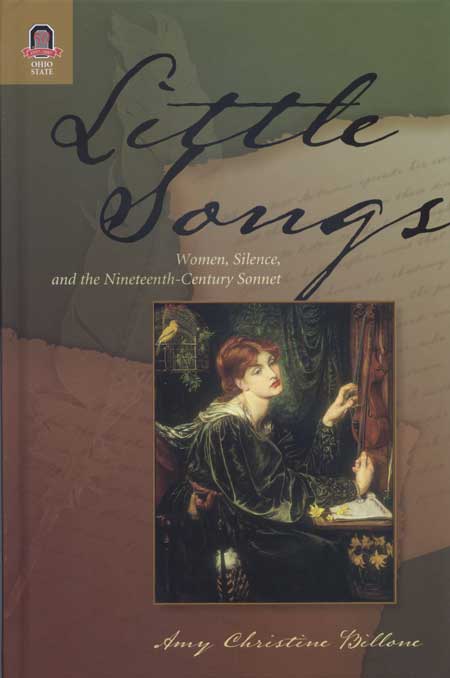 Little Songs
Little Songs
Women, Silence, and the Nineteenth-Century Sonnet
Amy Christine Billone
“Although every chapter of Little Songs is richly informed by Billone’s deep immersion in all the relevant scholarship . . . , Billone reserves her own critical voice for expansive close readings of carefully selected sonnets to demonstrate how these four great poets worked with form to reformulate their positions in literary history.” —South Atlantic Review
“[D]eserves a wide and warm reception. It is a short, deep book characterized by conceptual acuity, integrative thinking, and exciting close readings.” —Victorian Literature and Culture
“Little Songs offers evocative meditations and illuminating close readings in pursuit of a more nuanced understanding of the female sonnet tradition and its poetics of silence.” —Victorian Poetry
The strength of Little Songs is Billone’s sensitivity to form and figure, to syntax, to semantics (particularly to ‘semantic silence’ [103]), and to voice and muteness. The author illuminates the most subtle of formal, figural, grammatical, and syntactical nuances in intricate readings that illuminate each poet’s subtle employment of silences and silencings. The readings show the poems prying apart the space between sound and silence in pursuit of a claim to subjectivity, and they excel in bringing to light each poet’s slow accretion of meaning around not only voice rhymes but also ‘mute’ ones . . . .” —Victorian Studies
“Though self-confessedly devoted to nineteenth-century women poets’ preoccupation with silence, the book abounds with cursory but pointed observations and detailed comparative analyses which purposefully cut across that boundary. . . . Billone has written a valuable study that not only explores the dynamic field of tension between muteness and speech in nineteenth-century women’s sonnets, but also gives the initial impetus to a more extensive inquiry into the complex functioning of silence and sound in men’s and women’s sonnets throughout the genre’s entire history.” —The Journal of Pre-Raphaelite Studies
“Billone’s book redefines the sonnet as a vital part of women’s literary history.” —Scott Lewis, editor of The Brownings’ Correspondence
In Little Songs: Women, Silence, and the Nineteenth-Century Sonnet, Amy Christine Billone analyzes the bond between lyric poetry and silence in women’s sonnets ranging from the late eighteenth-century works of Charlotte Smith, Helen Maria Williams, and Anna Maria Smallpiece to Victorian texts by Elizabeth Barrett, Christina Rossetti, Isabella Southern, and other, lesser-known female poets. Although scholars acknowledge that women initiated the sonnet revival in England, Little Songs is the only major study of nineteenth-century female sonneteers.
Billone argues not that women’s sonnets overcame silence in favor of lyrical speech during the nineteenth-century sonnet revival, but rather that women simultaneously posited both muteness and volubility through style and theme. In opposition to criticism that stresses a modern shift from compensatory to non-consolatory poems of mourning, Billone demonstrates how women invented contemporary elegiac poetics a century in advance.
Adding to critical interest in the alliance between silence and literature, this book offers a complex study of the overwhelming impact that silence makes, not only on British women’s poetry, but also on the development of modern poetry and intellectual inquiry. Ultimately, Little Songs illustrates how the turn away from the kind of silence that preoccupied nineteenth-century women poets introduced the start of twentieth-century thought.
Amy Christine Billone is an assistant professor of English at the University of Tennessee.
|
Mar 2007 Literature and Criticism, British; Poetry/General 199 pp. 6x9 |
|
| $54.95 cloth 978-0-8142-1042-0 | Add cloth to shopping cart |
| $14.95 CD 978-0-8142-9122-1 | Add CD to shopping cart |


